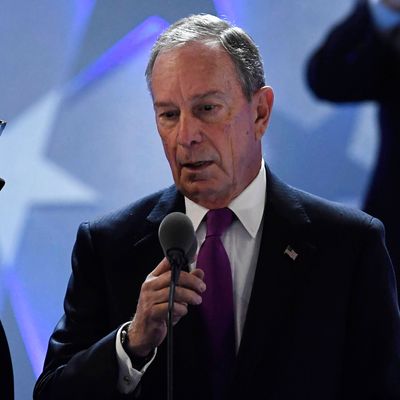
For a moment this past winter, Michael Bloomberg surveyed the American political landscape (and/or a cocktail party at Davos) and asked himself, “Who will speak for the silent majority that longs for Wall Street deregulation, entitlement cuts, robust gun control, expansionary immigration, and soda bans?”
The former New York mayor loudly mulled a presidential bid, even commissioning a potential campaign ad. But by early March, Bloomberg realized that he didn’t actually have much political appeal outside of cosmopolitan centers. The Democratic Party, however, has yet to experience that epiphany. And so it has invited Bloomberg to endorse Hillary Clinton in prime-time, during the penultimate night of its convention.
It’s not hard to deduce the Democrats’ reasoning here. A big part of Clinton’s general-election strategy hinges on turning out suburb-dwelling centrists and moderate Republicans. Bloomberg is a former Republican, and the “fiscally conservative, socially liberal” politician par excellence.
But if an openly misogynistic pseudo-fascist — whom The Economist considers one of the “top ten risks” to the global economy — isn’t enough to convince an upscale Republican to cross the aisle in November, it’s difficult to understand why Michael Bloomberg’s encouragement would.
Along with this minimal upside, Bloomberg’s endorsement brings some downside risks. One of the central challenges of this year’s convention has been to mollify the tensions within the Democratic tent. Bloomberg’s appearance only increases those tensions. Few politicians on this planet better embody the strain of liberalism that left-Democrats wish for their party to disavow.
It’s not just that Bloomberg champions the finance industry. Or that he’s a deficit hawk who wants to slash Social Security. He’s also a leading proponent of discriminatory policing — one who defended New York’s stop-and-frisk program by arguing that police should actually stop fewer white residents and more black ones.
And while Donald Trump and Ted Cruz have proposed subjecting Muslim communities to discriminatory surveillance, Bloomberg has actually overseen such surveillance. Through the first two days of the DNC, virtually every speaker has expressed outrage over Trump’s suggestion that minority rights must be sacrificed on the altar of fear. On Wednesday night, the DNC will feature a speaker who took that suggestion.
The problem here isn’t just one of ideological consistency. It’s also that the biggest threat to Hillary Clinton’s marathon infomercial is Bernie Sanders’s activist delegates and their affinity for booing their ideological opponents. Putting Bloomberg onstage isn’t much different than hanging a “Please Boo, Self-Righteous Opponents of Racial and Economic Injustice” sign from the proscenium.
Beyond unifying the Democratic base, Clinton’s other major challenge is to improve her standing with blue-collar whites. Donald Trump’s enormous advantage among whites without a college degree is the one thing keeping this election close. A Wall Street titan who loves free trade and hates large sodas is not a helpful ambassador to that constituency.
Maybe Bloomberg’s endorsement will win over every last socially liberal bond trader in the Greater New York Area. Even so, there were better faces for the Democratic Party to put forward in its prime-time hours.






























